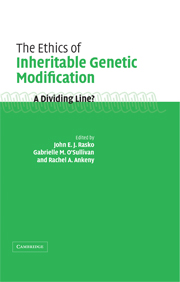Book contents
- Frontmatter
- Contents
- List of contributors
- Foreword: shopping at the genetic supermarket
- List of abbreviations
- Acknowledgments
- 1 Is inheritable genetic modification the new dividing line?
- 2 The science of inheritable genetic modification
- 3 Nuclear cloning, embryonic stem cells, and gene transfer
- 4 Controlling bodies and creating monsters: popular perceptions of genetic modifications
- 5 Inheritable genetic modification as moral responsibility in a creative universe
- 6 Ethics and welfare issues in animal genetic modification
- 7 Radical rupture: exploring biologic sequelae of volitional inheritable genetic modification
- 8 “Alter-ing” the human species? Misplaced essentialism in science policy
- 9 Traditional and feminist bioethical perspectives on gene transfer: is inheritable genetic modification really the problem?
- 10 Inheritable genetic modification and disability: normality and identity
- 11 Regulating inheritable genetic modification, or policing the fertile scientific imagination? A feminist legal response
- 12 Inheritable genetic modification: clinical applications and genetic counseling considerations
- 13 Can bioethics speak to politics about the prospect of inheritable genetic modification? If so, what might it say?
- Glossary of scientific terms
- Index
Foreword: shopping at the genetic supermarket
Published online by Cambridge University Press: 29 January 2010
- Frontmatter
- Contents
- List of contributors
- Foreword: shopping at the genetic supermarket
- List of abbreviations
- Acknowledgments
- 1 Is inheritable genetic modification the new dividing line?
- 2 The science of inheritable genetic modification
- 3 Nuclear cloning, embryonic stem cells, and gene transfer
- 4 Controlling bodies and creating monsters: popular perceptions of genetic modifications
- 5 Inheritable genetic modification as moral responsibility in a creative universe
- 6 Ethics and welfare issues in animal genetic modification
- 7 Radical rupture: exploring biologic sequelae of volitional inheritable genetic modification
- 8 “Alter-ing” the human species? Misplaced essentialism in science policy
- 9 Traditional and feminist bioethical perspectives on gene transfer: is inheritable genetic modification really the problem?
- 10 Inheritable genetic modification and disability: normality and identity
- 11 Regulating inheritable genetic modification, or policing the fertile scientific imagination? A feminist legal response
- 12 Inheritable genetic modification: clinical applications and genetic counseling considerations
- 13 Can bioethics speak to politics about the prospect of inheritable genetic modification? If so, what might it say?
- Glossary of scientific terms
- Index
Summary
Consider … the issue of genetic engineering. Many biologists tend to think the problem is one of design, of specifying the best types of persons so that biologists can proceed to produce them. Thus they worry over what sort(s) of person there is to be and who will control this process. They do not tend to think, perhaps because it diminishes the importance of their role, of a system in which they run a “genetic supermarket,” meeting the individual specifications (within certain moral limits) of prospective parents … This supermarket system has the great virtue that it involves no centralized decision fixing the future of human type(s).
The genocide of deaf culture?
Robert Nozick's genetic supermarket has arrived on the wings of angels brought to us by Ron Harris, the founder of ronsangels.com, “the only website that provides you with the unique opportunity to bid on eggs from beautiful, healthy, intelligent women.” How should we respond to this and other options that will soon be beckoning? To assist us in answering these questions, I shall begin by considering a technique that has been with us for some time, but that has the effect of changing the nature of children. Understanding the basis on which this technique can be supported may help us to grapple with the more difficult question of what we should do about newer options that also change the nature of our children.
- Type
- Chapter
- Information
- The Ethics of Inheritable Genetic ModificationA Dividing Line?, pp. xiii - xxxiiPublisher: Cambridge University PressPrint publication year: 2006



